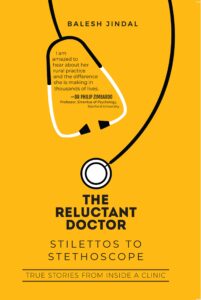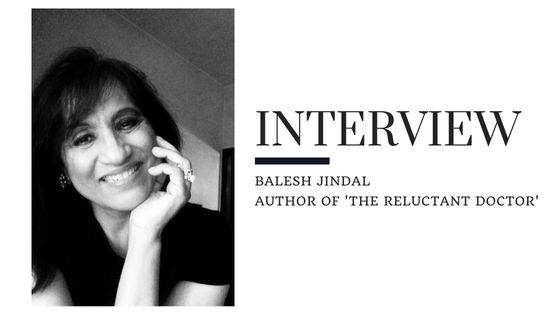About Balesh Jindal
An award winner who received the Award for Compassion from Stanford University in 2013 for her essay on her work with young girls.
Renowned channel BBC.com featured her work as The Most Compassionate Day in the World.
The essay was featured in many international journals.
Dr. Balesh presented His Holiness the Dalai Lama with her painting in 2014
Dr. Balesh is a graduate of the prestigious Lady Hardinge Medical College in Delhi, and has a professional medical practice for the last thirty nine years. Leaving a high profile career abroad, she chose the role of a low brow, village doctor. Overcoming initial resentment, the rural clinic became a compelling and sustaining need for her. Treating the fifth generation of the families that adopted her as their ‘family doctor’ decades ago, gives her invaluable insight into family dynamics and relationships. These heartwarming and true stories touch us in her latest book The Reluctant Doctor.
Dr. Balesh lives in Delhi with her husband who is a surgeon. Her son and daughter are settled in the USA.
Dr. Balesh is also a renowned artist with a creative portfolio of art, poetry and photographs. Being a physician, she has observed humankind at its lows and saintly highs. This observation of people has imparted a unique insight to her creative and aesthetic journey. She brings out the beauty and soul in the simplest of things and she believes that it takes very little effort to add beauty to daily life. Her love for writing, photography, poetry and art are all facets of an aesthetic expression, it is an expression of dreams found and lost on the way.
Her coffee table book A Hundred Dreams has received excellent reviews by K. Jayakumar president of Poetry Society of India.
1 A collection of poems titled ‘Dear Father’ in 1994.
2 The Reluctant Doctor a heartwarming yet eye opening, true stories from a GPs chamber, 2022.
3 A Hundred Dreams. Searching for myself. A coffee table book that has timeless pictures of benches around the world taken over a decade with heartfelt verses.
LiFT: Tell us about your book, the journey of writing it and its content.
Balesh: I am a graduate of the prestigious Lady Hardinge Medical College in Delhi, and have had a professional medical practice for the last thirty-nine years. Leaving a high profile career abroad, I was cast in the role of a low brow, village doctor. From initial resentment, the rural clinic became a compelling and sustaining need for me. Treating the fifth generation of the families that adopted me as their ‘family doctor’ thirty eight years ago, gives me an invaluable insight into family dynamics and relationships. Watching thousands of lives unfold in the clinic, it was natural that the stories found their way in The Reluctant Doctor.
LiFT: Why you chose this title?
Balesh: Dr. Balesh is a graduate of the prestigious Lady Hardinge Medical College in Delhi, and has had a professional medical practice for the last thirty eight years. Leaving a high profile career abroad, she chose the role of a low brow, village doctor. Overcoming initial resentment, the rural clinic became a reality.
The clinic was a big step down in life. From dreaming of being a specialist, I sat dispensing my own concoctions and doing my own blood investigations. How basic could one get? It was a free fall but I pushed through and tried to be the best at it. Falling from my coveted pedestal was painful. I went about the daily, disheartening drives down NH8, to my small clinic. I knew that the old cloak of privilege that ensconced me, had been ripped away as it was redundant in Kapashera. There would be no England, no paediatrics, no fancy clothes, no romantic parties and no fancy clothes.
Her dreams of going abroad soon faded away giving way to The Reluctant Doctor.
LiFT: When did you realize that you want to be a writer and what’s your inspiration behind it?
Balesh: Much before painting, I was writing poetry. My art is all about emotions, feelings and empathy. I love to watch people looking at my artworks trying to fathom their own feelings.
As thousands of patients walked into my clinic, I observed them intensely and found myself wondering about their lives, relationships, their sadness and joys.
People, and the way they live and behave fascinate me. I like to observe each fleeting emotion on the faces I see and store it in my mind. I draw my inspiration from the thousands of faces that have walked into my clinic for forty years and have spent years searching and probing those faces and their emotions”. The faces fascinate me, pique me and make me wonder at the number of masks we all carry within us. It is this passion to study faces and unravel their thoughts that intrigues me as an artist.
The challenge to bring that face alive on my canvas or a written page is what whets my appetite to paint and write and become better each day.
The daily routine of a rural medical practice and the effort to not make mistakes takes its toll. Art and writing provided me with a buffer where I could rejuvenate and reorganize myself. I think that it was my passion for creative pursuits that kept me sane for forty years of my practice.
LiFT: Where do you see yourself ten years down the line in the world of literature?
Balesh: I see myself writing more about people and why they behave the way they do. I like to study people and that’s where my muse lies.
These are untold and pertinent stories that have an urgency around them. Pertinent to our understanding of society. Pertinent to all societies as money and modernisation and their ill effects are universal. These are stories, observed and recorded at a slow pace, as I listened to them, felt them and lived with them for years, as they lay deliberating and contemplating. They are not pretty stories, as most of life is certainly not pretty, but they need to be told. Anyone who has an iota of a sense of social responsibility, needs to hear these.
There was no time for me to read too many books and how movies were affecting our youth. I was watching and dealing with these after effects in horror and dismay. There were gang rapes and suicides on a daily basis. They affected the children’s attendance in school followed by endless school dropouts
There were no records of these. Someone has to account for them.
I have hundreds of stories which I lived and breathed for four decades. I will be writing more about the people who saturated me with their joys and sadness.
LiFT: How much do you think marketing or quality of a book is necessary to promote a particular book and increase its readers?
Balesh: Marketing is like the branches of a tree. Although it’s the tree which stands tall and beautiful with strong roots but no one looks at it if it has no branches. So it is with a book. It maybe beautifully written but it stands alone without marketing and attracts no attention.
LiFT: What is the message you want to spread among folks with your writings?
Balesh: A lesson I learnt extremely late in life.
If one finds oneself against the tide, swim with grace and dignity. I learnt that the rural clinic was not a degradation. I just needed a wider vision to look at my situation from a different lens. A vision that got buried with my ‘highly educated and learned senses’.
To make peace with my lowly position was difficult so I had a lot of unlearning to do. I learnt that passion was not akin to happiness. Passions can be changed. So can ambitions. It’s the environmental circumstances that guide passion and ambition. To chase personal targets may not lead to a fulfilled life. One has to retarget. Even though the clinic was not my idea of an ideal practice, I pursued it, redesigning my path as I went along. That became my unlearning and my absolution.
LiFT: What do you do apart from writing?
Balesh: Poetry, art and photography are my other passions that keeps me on my toes. The daily routine of a rural medical practice and the effort to not make mistakes takes its toll. Art provides me with a buffer where I can rejuvenate and reorganize myself. I think that it was my passion for art that kept me sane for forty years of my practice.
Being a physician was a blessing in disguise for I never needed a muse for my art.
Looking at the faces of my patients, peering, staring and analysing them for signs of disease became a necessary habit and the constant input of people and their wizened faces prodded me on and set me on the path of figurative art and poetry.
LiFT: What are the activities you resort to when you face a writer’s block?
Balesh: I write poems and I turn to art whenever I face a writer’s block which is very rare because I am raring to write.
My poems are about hidden wounds that threaten to break us, yet we stand strong and shine. I don’t write about any profound lessons or deeper meanings of life. They are just vignettes of a normal life.
My second passion is art.
LiFT: What if your story will be adopted as a movie? Whom would you want to work as a director or actors in it?
Balesh: An actor who looks real and unaffected would be ideal. It’s difficult to answer in speculation.
LiFT: Are you working on your next book? If yes, please tell us something about it.
Balesh: My next book will be a collection of short stories because I think one has the freedom to explore many topics in a collection of stories.
LiFT: What are your suggestions to the budding writers/poets so that they could improve their writing skills?
Balesh: Make notes either oral or written.
Write everyday even if it’s just a line.
I worked on a 40/10 min rule. Write for 40 minutes and a break for 10 minutes. It worked well for me.
Read Read Read especially if one faces a writer’s block.
Click here to order Balesh Jindal’s Book – The Reluctant Doctor



3 thoughts on “In Conversation with Balesh Jindal”
Excellent initiative & very courageous
Please send me links for your books
Thank you
Comments are closed.